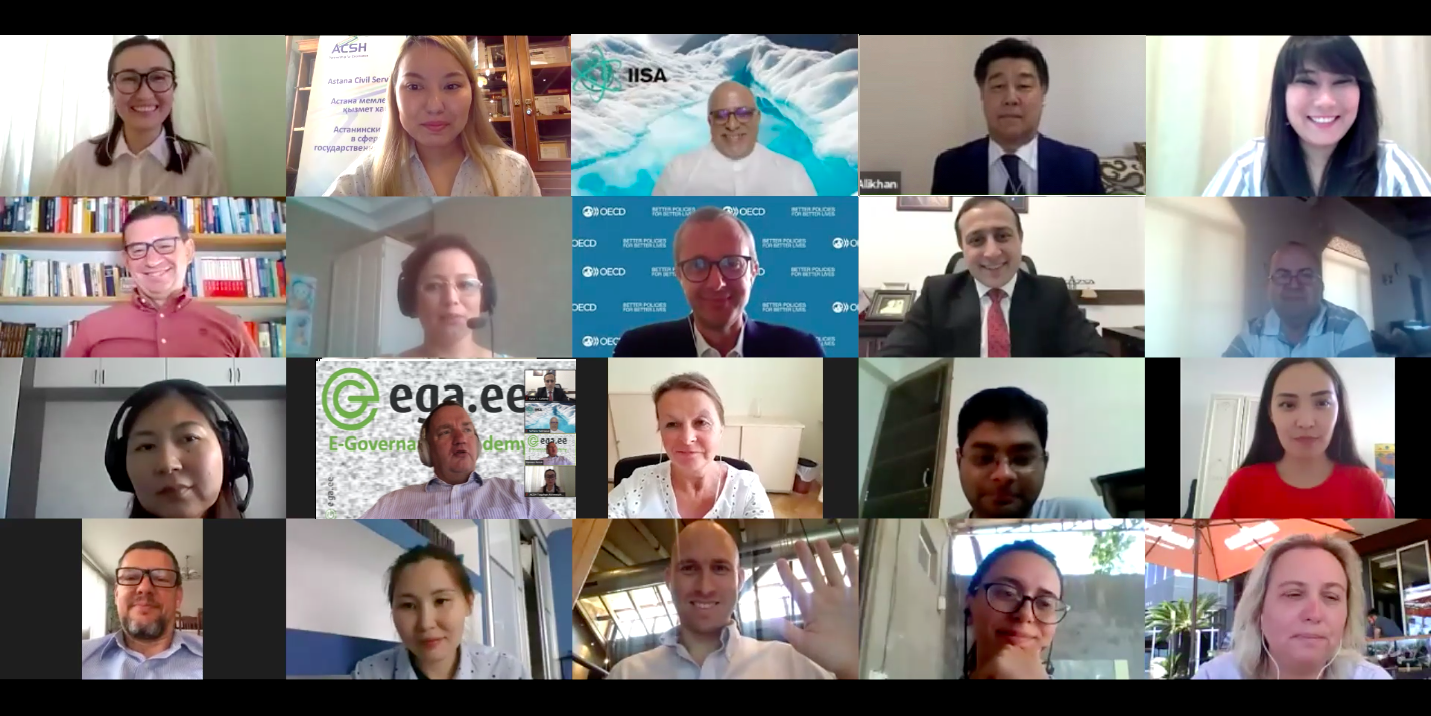Digital solutions against the pandemic were discussed by experts from 20 countries and the OECD at the session of the Astana Civil Service Hub
Experts and practitioners from Azerbaijan, Estonia, Israel, Kazakhstan, and the OECD presented digital solutions aimed at improving the efficiency of public administration and the quality of public service delivery in times of pandemic. The session of the Astana Civil Service Hub (ACSH) with the participation of representatives of more than 20 countries of the world was held at the e-Conference of the International Institute of Administrative Sciences (IIAS, Belgium).

Opening the session, Chairman of the Steering Committee of the Astana Civil Service Hub Mr. Alikhan Baimenov noted that “a quarantined environment, social distancing and remote work have accelerated the use of modern information technologies.... Moreover, the COVID-19 pandemic has repeatedly underlined the significance of public trust, not only as a social value per se, but also as effective administrative capital. For this, it is also important that innovative technologies are shaped in a way that guarantees transparent and open decision-making exclusive of any possible abuse, thereby ensuring citizens’ rights and freedoms of citizens”.
In this regard, he emphasized that it is crucial that the exchange of experiences concerns both the application of modern technologies and protection of citizens’ rights and freedoms in new circumstances.
In his welcoming speech the Director General of the International Institute of Administrative Sciences Mr. Sofiane Sahraoui thanked the ACSH for the partnership and organization of the panel session on the IIAS platform marking its 90th anniversary of foundation this year and expressed interest in continuing cooperation, including on research projects in the area of public administration.
During the session, presentations were made by representatives of Azerbaijan, Estonia, Israel, Kazakhstan, and the OECD.
In particular, Director of the Center for Development of Electronic Government of the Republic of Azerbaijan, Mr. Fariz Jafarov presented some innovative solutions and products as the e-Tabib, a mobile application that alerts citizens about potential COVID-19 carriers nearby, the e-mask respirator and others. He also focused in detail on the system of online registration of citizens’ movement during the quarantine, information about which was distributed through the Virtual Alliance of the ACSH among its participating countries. Using the experience of Azerbaijan, Akimat of Turkestan has developed a similar online system.
The Deputy Director of Estonian e-Governance Academy Mr. Hannes Astok noted in his speech that under the new conditions, most public services have been optimized. More than 1.1 million digital signatures are used daily in government, commercial, and private operations.
In his presentation, the Founder and Managing Director of the “Innovations Without Borders” (IWB, Israel) Mr. Benny Shlik, who participated in the session due to support of the Embassy of the Republic of Kazakhstan in Israel, noted that in 2019 the Government of Israel invested 1,650 projects in the amount of $ 480 million to the development and research innovative solutions in various fields. He emphasized that COVID-19 accelerated the processes of digital transformation that allowed to rebuild the state system and see new opportunities for promoting the ideas.
It is worth noting that according to the “Deep Knowledge Group” rating Israel is among top 3 safest countries in the context of the coronavirus pandemic, due to the use of digital mechanisms in the field of healthcare and ensuring public safety, just behind only Switzerland and Germany.
The Head of the International Cooperation Department of the “Zerde” National Infocommunication Holding” JSC of Kazakhstan Ms. Ayazhan Mukanova pointed out that over a short period, the IT
companies together with the Government of the Republic of Kazakhstan developed over 53 projects. During the emergency, citizens received more than 13.8 million state electronic services.
Policy Analyst of the Digital Government and Data Unit, OECD Directorate of Public Governance Mr. Joao Vasconcelos said that “COVID-19 world response and recovery will be driven by digital public sectors. Digital government maturity is today more than ever a central indicator for resilient, agile and responsive public sectors capable of navigating economic and social contexts in permanent disruption".
The session was attended by over 100 experts, academics, and government officials from more than 20 countries around the world.
- Experience of Azerbaijan in e-Governance by Mr. Fariz Jafarov, Director of E-Gov Development Center
- Experience of Estonia: How Digital Kept Country Going During COVID-19 Crisis by Mr. Hannes Astok, Deputy Director for Strategy and Development, the e-Governance Academy
- Israel and COVID-19 by Mr. Benny Shlick, Founder and Managing Direct at Innovation Without Borders
- Digital Respond to COVID-19: Experience of Kazakhstan by Ms. Ayazhan Mukanova, Head, International Cooperation Department, “Zerde” National Infocommunication Holding” JSC
- Tackling COVID-19 – Why Digital Government Matters by Mr. João Vasconcelos, Policy Analyst, Digital Government and Open Data of the Reform, Public Sector Division, OECD Directorate for Public Governance
The Virtual Alliance, created by the Astana Hub, is designed to assist governments in combating the COVID-19 pandemic, and is a digital platform that accumulates existing innovative solutions of the participating countries and partners of the Hub. Today, the virtual platform contains more than 30 useful resources provided by the participating countries and partners of the Hub.



